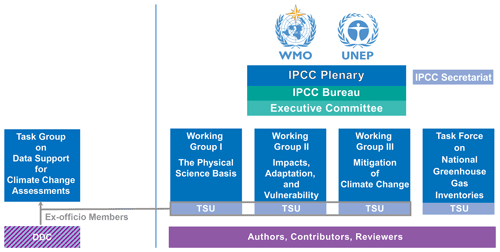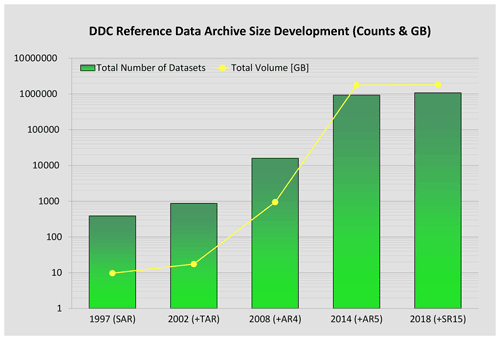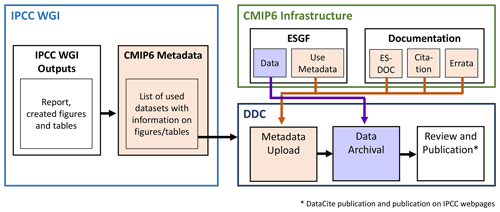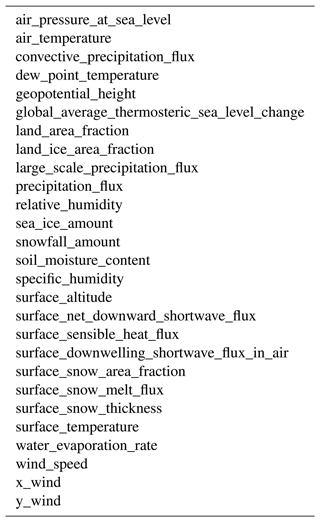the Creative Commons Attribution 4.0 License.
the Creative Commons Attribution 4.0 License.
Twenty-five years of the IPCC Data Distribution Centre at the DKRZ and the Reference Data Archive for CMIP data
Michael Lautenschlager
The Data Distribution Centre (DDC) of the Intergovernmental Panel on Climate Change (IPCC) celebrates its 25th anniversary in 2022. The DKRZ (German Climate Computing Center; German: Deutsches Klimarechenzentrum) is the only remaining DDC Partner from the original group jointly managing the DDC. In spite of changes in prioritization, it has been supporting the IPCC Assessments and preserving the quality-assured, citable climate model data underpinning the Assessment Reports over these years over the long term. An active and engaged collaborative community achieved advances in data standardization, data management best practices, and infrastructure developments. These evolving standards are reflected in the activities of the DDC. The introduction of the IPCC FAIR Guidelines into the current Sixth IPCC Assessment Report (AR6) has significantly changed the role of the DDC Partner DKRZ from an independent partner for long-term data preservation into an active partner involved in the IPCC's Sixth Assessment cycle. As a result, the DDC has gained exposure and visibility, posing a challenge and an opportunity to operationalize the IPCC's FAIR Guidelines and long-term preservation approaches. While the value of DDC services has been recognized, DDC sustainability remains unresolved and is currently being discussed within the IPCC as part of a general AR6 review process to formulate recommendations for the AR7 data management.
- Article
(3871 KB) - Full-text XML
- BibTeX
- EndNote
The current Data Distribution Centre (DDC; https://ipcc-data.org/, last access: 29 June 2022) of the Intergovernmental Panel on Climate Change (IPCC) is jointly managed under a Memorandum of Understanding (Xing, 2021) by four partners: the German Climate Computing Center (Deutsches Klimarechenzentrum, DKRZ, Germany), the Center for International Earth Science Information Network (CIESIN, USA), the Spanish Research Council (CSIC, Spain), and MetadataWorks (UK). The DKRZ is the only remaining founding partner, and it has now been operating the DDC for 25 years. The DDC is overseen by the Task Group on Data Support for Climate Change Assessments (TG-Data; https://ipcc.ch/data, last access: 29 June 2022), which is a non-permanent part of the IPCC's structure (Fig. 1). TG-Data member experts are complemented by ex officio members representing the DDC Partners and the Technical Support Units (TSUs) of the three IPCC Working Groups (WGs). The former UK DDC Partner Centre for Environmental Data Analysis (CEDA) continues its contribution to the Sixth IPCC Assessment Report (AR6) with financial support from the WGI TSU. The core role of the DDC is the support for IPCC authors and users of data and scenarios underpinning IPCC outputs (see DDC Guidance; IPCC, 2018a). The DDC makes special efforts to support users in developing countries.
The DDC was formally established at the Thirteenth Session of the IPCC (IPCC-13) on 22 and 25–28 September 1997 in the Maldives (IPCC, 1997). Deutsches Klimarechenzentrum (DKRZ) in Germany and the Climatic Research Unit (CRU) in the United Kingdom were selected to execute shared DDC operation, and the Finnish Meteorological Institute (FMI) was to contribute guidance and training (see Fig. 2). During the Second Assessment Report (SAR; IPCC, 1995) cycle, IPCC Working Group II (WGII) had requested to lower the barriers to using data from future climate scenarios provided by the Coupled Model Intercomparison Project (CMIP) of the World Climate Research Programme (WCRP). At the IPCC Workshop on Regional Climate Change Projections for Impact Assessment (London 24–26 September 1996) and subsequent meetings of the established IPCC Task Group on Climate Scenarios for Impact Assessment (TGCIA), requirements for data availability, data standardization, and data quality together with the need for guidance materials were formulated. TGCIA recommended the establishment of a DDC to the IPCC Bureau in the same year. On 22 July 1997, the IPCC Bureau requested governments to nominate institutions to act as the DDC and to provide the necessary financial support to establish and maintain the DDC function.
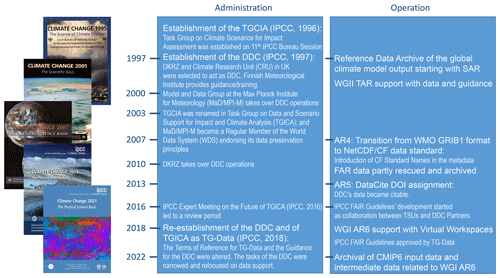
Figure 2IPCC DDC history and main achievements of the DDC Partner DKRZ over the past 25 years (images from cover pages of the IPCC ARs starting with SAR 1995).
The DDC Partners agreed that the DKRZ should be responsible for the global climate model data related to CMIP, while the other DDC Partners took up the responsibility for other datasets in support of the IPCC WGs. Atmospheric near-surface variables were collected, aggregated and disseminated by the DDC together with guidance material for the Third Assessment Report (TAR; IPCC, 2001). After this successful operation of the DDC, the IPCC Bureau received data requests from WGIII and WGI. WGIII's data request was similar to that of WGII and could be integrated into the existing DDC service, while WGI's data needs were more complex, requesting most of the CMIP datasets. The Program for Climate Model Diagnosis & Intercomparison (PCMDI) accepted the establishment of the CMIP3 data archive in support of WGI. In cooperation with the PCMDI, the DDC Partner DKRZ extracted the CMIP3 data subset for WGII and WGIII from the CMIP3 archive for the Reference Data Archive of the Fourth Assessment Report (AR4; IPCC, 2007). In the Fifth Assessment Report (AR5; IPCC, 2013) cycle, increasing CMIP5 data volumes led to the development of a federated data archive and the ESGF (Earth System Grid Federation) data infrastructure. The European contribution was coordinated by IS-ENES (Infrastructure for the European Network for Earth System modelling). The DDC refocused on the long-term preservation of the CMIP5 data underpinning the AR5 by transferring the CMIP5 data at the WGI snapshot date into the DDC AR5 Reference Data Archive. For nearly 2 decades, the IPCC DDC has closely cooperated with the CMIP data infrastructure.
The Task Group TGCIA was renamed the Task Group on Data and Scenario Support for Impact and Climate Analysis (TGICA) in 2003. The TGICA developed a vision paper in 2015 and described the challenges the TGICA was facing related to its limited capacity to deliver on its mandate. The IPCC Panel decided to revise the TGICA's mandate and to hold an IPCC Expert Meeting on the future of the TGICA (IPCC, 2015, 2016). Vaughan (2016) summarizes the TGICA's challenges and emphasizes that the TGICA needs to be strengthened to be able to contribute in new ways to improve the access and use of climate data and scenarios for research and decision-making through the DDC. A sharpened mandate, the clear identification of specific goals, and a realistic sense of the resources required to accomplish these goals are recommended. An IPCC Ad-hoc Task Force TGICA took up the results from the IPCC Expert Meeting and formulated revised Terms of Reference for the re-established Task Group on Data Support for Climate Change Assessments (TG-Data) and a revised Guidance for the DDC, which were approved at IPCC-47 in March 2018 (IPCC, 2018b). The focus of the DDC was narrowed to data support tasks.
The DKRZ is the DDC Partner responsible for the long-term preservation of the global climate model data provided by CMIP. Starting with the Second Assessment Report (SAR; IPCC, 1995), core variables for the characterization of the state of the earth system (Table A1 in Appendix A) from model projection of the future climate were archived long-term at the DKRZ, building the Reference Data Archives for the global climate model data underpinning the IPCC's ARs.
During data archiving, the data are stored on tape, and the metadata are enriched and quality-assured to provide sufficient and high-quality information for various downstream users without specific knowledge of climate model applications. Added metadata include context information on projects, experiments, and models as well as discovery information on spatial-temporal coverage, parameters, and contact information. In the SAR, this information was gathered mostly from the data providers by the DDC. With the increasing level of organization and standardization of CMIP, this labor-intensive and non-standardized metadata gathering from data providers could be partially replaced by machine access of CMIP resources, e.g., accessing the ESGF index.
The size of the Reference Data Archives for the different ARs increased from around 10 GB and 400 datasets for SAR and TAR to ca. 1 TB and 1500 datasets for AR4 and then to 1.7 PB and 910 000 datasets for AR5 (Fig. 3). The reasons are an increased number of archived variables per model run, an increased number of models participating in CMIP, and the inclusion of daily and sub-daily data in addition to monthly data. In collaboration with the NCAR (National Center for Atmospheric Research), a subset of data underpinning the FAR was rescued from the NCAR's data archive in the original formats and added to the DDC in 2008. Because of the low level of standardization, these datasets are difficult to (re-)use. Data underpinning the IPCC Special Report on Global Warming of 1.5 ∘C (SR1.5; IPCC, 2018c) were transferred into the DDC Reference Archive in 2018. The archiving of the CMIP6 data subset underpinning the AR6 is ongoing. Download statistics show the long-term interest of users in the DDC Reference Data (Fig. 4).
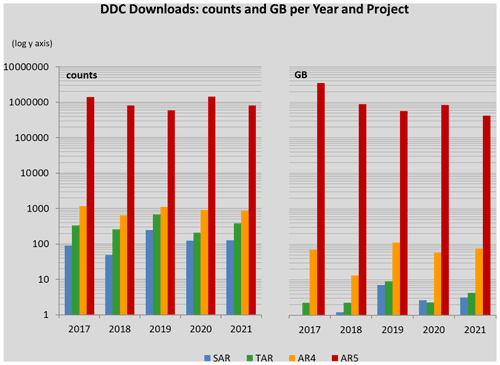
Figure 4Downloads in number of datasets (counts) and data volume (GB) from the DDC Reference Data Archive over the last 5 years per Assessment Report (FAR is left out because of the incomplete Reference Archive and AR6 including SR1.5 because of the ongoing data archiving; Stockhause, 2022).
As a DDC Partner, the DKRZ has committed to ensuring its DDC data remain accessible and reusable over the long term, which involves cyclic renewal of hardware, continuous maintenance of software, and metadata and data curation. A copy of the DDC data is stored off-site at the Max Planck Computing and Data Facility (MPCDF) in Garching, Germany. New generations of hardware (tape system), for example, require the copying of the DDC data holdings on new cartridges. Software updates for data discovery, access, and exchange are required to comply with new standards and interfaces in order to enhance the user experience and to meet evolving user needs. An example for a metadata curation measure was the addition of Climate and Forecast (CF) standard names to the metadata of the DDC SAR and TAR Reference Data Archives. To overcome the data volume barrier for DDC data reuse of IPCC users located in developing countries with low internet bandwidths, the DDC introduced a service whereby users can order a set of preselected variables for seven regions on DVD and USB devices.
The DKRZ adjusted to evolving best practices for data management. The DKRZ long-term data archive including the IPCC DDC Reference Data Archive was approved in 2003 as WDC Climate (WDCC) by the ICSU World Data Center system. The DKRZ became a Regular Member of the ISC World Data System (WDS; https://www.worlddatasystem.org/, last access: 29 June 2022) in 2008, the year of the WDS's establishment. Therefore, the DDC Partner DKRZ complies with the WDS's common research repository standards. With the founding of DataCite in 2009, registering data DOIs in order to make data citable became a community expectation, which was taken up by the DDC Partner DKRZ for the AR5 Reference Data Archive published in 2013 and 2014. The long-term archiving of AR5 provided further major changes in the workflow due to the extremely high data volume and several changes in the CMIP5 data infrastructure (https://pcmdi.llnl.gov/mips/cmip5/, last access: 29 June 2022; Taylor et al., 2012):
-
The data were disseminated by the newly developed federated and decentralized infrastructure of the Earth System Grid Federation (ESGF; https://esgf.llnl.gov, last access: 29 June 2022; Williams et al., 2016).
-
Detailed model and experiment documentations were gathered from the CMIP5 participants by the Earth System Documentation project (ES-DOC; https://es-doc.org, last access: 29 June 2022: Lawrence et al., 2012).
-
A three-level quality control procedure (CMIP5 QC; https://cmip5qc.wdc-climate.de, last access: 29 June 2022) was applied to ensure basic data quality, the consistency of metadata, and metadata conformance with community standards like NetCDF/CF and project standards like the Data Reference Syntax (DRS). Passing the three quality control levels was the prerequisite for the acceptance by the IPCC DDC for the IPCC AR5 Data Reference Archive (Stockhause et al., 2012).
The size of the CMIP5 data archive required a high level of automation for metadata and data ingestion as well as for the quality control checks. New interfaces to the infrastructure components ESGF, ES-DOC, and DataCite had to be developed for insertion of use and discovery metadata and data DOI registration. The DDC AR5 data archived long-term were made searchable and accessible through the ESGF, which has become the standard infrastructure for climate-related data. ETH Zurich collected a CMIP5 data subset in support of the IPCC AR5 authors in an alternate data structure. Due to difficulties relating the individual datasets back to the CMIP5 reference datasets, the DDC AR5 Reference Data Archive was supplemented by an IPCC Working Group I AR5 snapshot. Discussions with the ETH Zurich provided valuable input for the IPCC FAIR Guidelines adopted for AR6 and the long-term archiving of the CMIP6 input data in the DDC.
The DDC relies in its efforts and services on data provided by CMIP6 participants and on the standardization community efforts of several organizations and institutions. The PCMDI led the AMIP and CMIP data standardization, and other groups worked on the NetCDF/CF data standard (https://cfconventions.org, last access: 29 June 2022), the CoreTrustSeal research repository standard (https://www.coretrustseal.org/, last access: 29 June 2022), or the DataCite DOI data publishing standard.
The TGICA was under review of the IPCC from the start of the Sixth Assessment Cycle in January 2016 until the re-established TG-Data held its first meeting in November 2019. This was a little less than a year prior to the original WGI literature and data cut-off date of 30 September 2020, which was postponed to 31 January 2021 due to the COVID-19 pandemic. The lack of the coordinating task group hampered the formulation and implementation of the FAIR Guidelines for the Sixth Assessment Report (AR6).
The idea for adopting the FAIR Guidelines was born during the IPCC Expert Meeting on the future of the TGICA in January 2016. The aim was to enhance the transparency of the IPCC AR6 and thereby contribute to the IPCC's integrity. The IPCC FAIR Guidelines implement the established data management principles of FAIR (Findable, Accessible, Interoperable, Reusable; Wilkinson et al., 2016) for data and TRUST (Transparency, Responsibility, User Focus, Sustainability, Technology; Lin et al., 2020) for repository operations into the Sixth Assessment cycle. The FAIR data principles describe requirements for datasets to become an integral part of the research environment. The TRUST principles for repositories and their implementation in the CoreTrustSeal complement these essential data properties by best practices for repository operations in long-term data preservation and data stewardship.
The development of the FAIR Guidelines started at the First IPCC AR6 Data Workshop in Hamburg, Germany, 19–20 September 2017 (Stockhause et al., 2017) and continued at the second virtual meeting on 20 February 2018. In collaboration with the WDS, which started at the Data Repository Day 2018 (World Data System, 2018), the FAIR Guidelines concept was formulated in Stockhause et al. (2019). This concept was discussed with IPCC authors of WGI and WGII at the IPCC Expert Meeting on assessing climate information for regions in Trieste, 16–18 May 2018 (IPCC, 2018d). The implementation of the FAIR Guidelines into tools supporting the authors was the topic of a WGI training on data and software development in Oberpfaffenhofen, Germany, 6–7 June 2019 (IPCC, 2019). An early draft of the FAIR Guidelines was formally approved by TG-Data at its first meeting in Montreal, Canada, 6–8 November 2019, and the official version 1.0 was adopted by TG-Data in a virtual meeting in 2022.
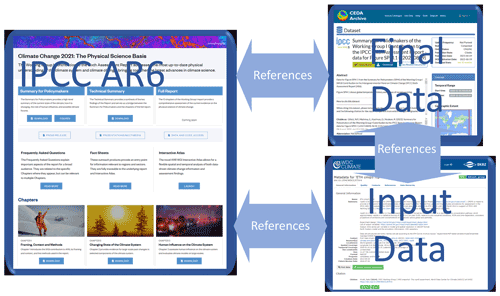
Figure 5Schematic vision of the bidirectional references between report, input data, and final datasets in IPCC AR6 enabling users to navigate among these AR6 results (screenshots from IPCC, CEDA, and DKRZ web pages).
The IPCC FAIR Guidelines (Pirani et al., 2022) call for increased attention to three aspects.
-
Traceability of key statements and of figure and table creation. Information on input datasets like CMIP6 (Eyring et al., 2016), final data displayed in figures, and analysis scripts generating the figures are collected from the authors by the WGI AR6 TSU. This information is recorded for every figure as part of the Supplement associated with each chapter. Moreover, bidirectional references between the digital AR6, final datasets, and input datasets will enable users to navigate between these AR6 products (Fig. 5).
-
Credit for input data. input datasets used by the authors are cited in the AR6 in compliance with Good Scientific Practices (Deutsche Forschungsgemeinschaft, 2019). In the case of CMIP6 data, data citation is required by the Creative Commons licenses (CC; https://creativecommons.org/, last access: 29 June 2022), under which CMIP6 data were published. CMIP6 data are cited in a summarized form in Appendix II of the WGI AR6 (https://www.ipcc.ch/report/sixth-assessment-report-working-group-i/, last access: 29 June 2022; IPCC, 2021), the provenance metadata of the IPCC WGI Interactive Atlas (https://interactive-atlas.ipcc.ch/, last access: 29 June 2022), and for each figure in the Supplement.
-
Long-term preservation of input data, scripts, and final data. the information, scripts, and final datasets collected by the WGI TSU are transferred to the designated repository for long-term preservation. DOI registration makes the data and scripts citable and enables data users to give credit to chapter scientists for them. In the case of CMIP6, the TSU compiled dataset lists for the DDC Partner DKRZ based on the data usage information collected from the authors. For long-term data archiving, the listed CMIP6 datasets are replicated, use metadata are accessed from the ESGF, and further documentations are accessed from the Citation Service (Stockhause and Lautenschlager, 2017) and if available from ES-DOC (Pascoe et al., 2020). The long-term archival workflow is depicted in Fig. 6.
The implementation of the IPCC FAIR Guidelines required a close cooperation between WGI TSU and the DDC Partners and relied on the CMIP6 infrastructure partners and information provided by the CMIP6 participants as well as on the information compiled by the IPCC authors.
The implementation of the FAIR Guidelines expanded the role of the DDC Partner DKRZ from a responsibility limited to a long-term data archive, operating mostly independently of WGI and the assessment cycle, to a more active partner with an enhanced role within the Sixth Assessment cycle. Close cooperation was required with the WGI TSU to formulate and implement the FAIR Guidelines. Thus, DDC Managers participated in the IPCC Expert Meeting on Assessing Climate Information for Regions in May 2018 and jointly organized the WGI Training on Data and Software Development in June 2019 together with the WGI TSU. Advice based on the DDC's long experience in data management was provided for gathering the necessary information on data usage required of the authors, best practices in data citation, and the definition of machine-actionable interfaces. The DDC Manager at the DKRZ joined the WGI AR6 authors as contributing author and reviewed the First-Order Draft and Second-Order Draft of the report to provide expert advice on data management aspects.
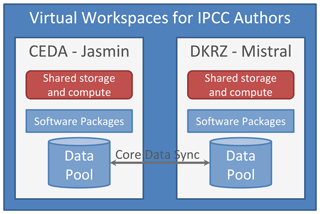
Figure 7Virtual Workspaces provided by CEDA and the DKRZ for IPCC AR6 authors (co-funded by IS-ENES).
This active role of the DDC in AR6 increased the DDC's visibility and resulted in requests for further support of the IPCC author teams during the preparation of the AR6. The DDC Partner DKRZ and former DDC Partner CEDA provided Virtual Workspaces (Stockhause, 2020; Fig. 7) for the authors co-funded by the EU project Infrastructure for the European Network for the Earth System Modelling (IS-ENES; http://is.enes.org, last access: 29 June 2022). These collaboration platforms provided storage and compute resources for the chapter author groups together with access to requested core datasets and common software packages. Moreover, the DKRZ supported the technical aspects of the ESMValTool (https://www.esmvaltool.org/, last access: 29 June 2022; Eyring et al., 2020) development and hosts the web page with CMIP evaluation results. On the national level, the DDC Manager at the DKRZ joined the authors' subgroup of the German IPCC Coordination Office (https://www.de-ipcc.de/, last access: 29 June 2022) as German contributor to the IPCC AR6.
During implementation of the FAIR Guidelines, questions arose that had to be solved with the IPCC Bureau. One of these involved the original licenses modeling groups attached to their CMIP6 data, which were too restrictive for a general reuse of IPCC data products, e.g., final data or Atlas data. The IPCC had to ask the CMIP6 participants through the Working Group on Coupled Modelling (WGCM) for an exemption of the CMIP6 data licenses. As representatives of TG-Data, DDC Partner DKRZ and former DDC Partner CEDA were responsible for helping to ensure that IPCC technical requirements were met by the CMIP infrastructure being developed under the coordination of the WGCM Infrastructure Panel (WIP; https://www.wcrp-climate.org/wgcm-cmip/wip, last access: 29 June 2022) and contributed data aspects to the IPCC Informal Group on Publications.
Independent of the FAIR Guidelines, the DDC Partners intensified their collaboration. The new UK DDC Partner MetadataWorks set up a joint DDC catalogue to improve the discovery of DDC data holdings. The DKRZ's DDC Manager contributed to the development of the DDC's profile of the Data Catalog Vocabulary standard (W3C DCAT; https://www.w3.org/TR/vocab-dcat-3/, last access: 29 June 2022) and provided the metadata of its Reference Data Archive in December 2021. A central DDC help desk was set up to coordinate the DDC user support. The revision of the DDC web pages is ongoing with the aim of retiring outdated pages and refocusing the content on IPCC-related data, as called for under the renewed DDC Guidance.
All of the IPCC Assessments have heavily drawn on the latest climate change research provided by the WCRP CMIP project. The core work of IPCC authors is the assessment of the latest peer-reviewed literature. CMIP data were used in the peer-reviewed literature and more directly for the creation of several IPCC report figures. With the introduction of the IPCC FAIR Guidelines, the dependency on CMIP-related literature and CMIP data were complemented by the dependency on CMIP6 infrastructure components (Petrie et al., 2021) and further DDC support activities (see Sect. 4). For CMIP6, the WIP was formed by WGCM in 2014 to coordinate the development of the CMIP infrastructure across multiple institutions and agencies. The standardization of CMIP6 data is important for the reusability of the data. This includes compliance to the NetCDF/CF standard and specific file name conventions, a uniform directory structure, and the collection and dissemination of the CMIP6 Controlled Vocabularies (CMIP6-CVs; https://github.com/WCRP-CMIP/CMIP6_CVs, last access: 29 June 2022; Taylor et al., 2018).
The necessary infrastructure components include the data infrastructure Earth System Grid Federation (ESGF; Williams et al., 2016; Cinquini et al., 2014), which disseminates the data and provides use metadata and references to further information like data citation through its index. The CMIP6 Citation Service (http://cmip6cite.wdc-climate.de, last access: 29 June 2022; Stockhause and Lautenschlager, 2017) contributes data references and the discovery metadata gathered in the CMIP6-CVs to the long-term data archiving (Stockhause et al., 2015) and thus links the data infrastructure to the long-term data preservation of the CMIP6 data subset in the DDC AR6 Reference Data Archive.
Apart from these necessary infrastructure components, ES-DOC provides detailed information on models, experiments, and errata for further metadata enrichment in the DDC Reference Data Archive. The Citation Service succeeded in having full data citation coverage for all datasets published in the ESGF in the literature and the data cut-off date for WGI AR6 on 31 January 2021, whereas the coverages of ES-DOC model descriptions and errata information are low. That means that the Citation Service and DDC mostly rely on the brief model descriptions in the CMIP6-CV provided by the CMIP6 participants during the registration process.
The agreed data standards and the high volume of the contributed data require thorough quality checks by the participants to ensure compliance and quality of the CMIP6 data. The conformance with the NetCDF/CF and the additional project metadata rules is automatically checked during ESGF data publication. The DDC complements them by metadata compliance and consistency checks.
At the same time, the DDC contributes unique services for the international climate community:
-
The DDC is the only data provider with a long-term commitment for data preservation and data services; it ensures that data will remain FAIR over time. Neither the ESGF data nodes nor the Copernicus Climate Data Store (CDS; https://cds.climate.copernicus.eu/, last access: 29 June 2022) has made such a commitment. Their focus lies on serving recent climate data.
-
The DDC preserves the data underpinning key statements of the Assessment Reports and thus the data on which several political decisions are based. The CMIP data subset in the DDC contains the scientific information and therefore is essential to trace back these decisions to the scientific basis.
-
As part of the IPCC Assessment process, the DDC reference climate data are quality-assured, enriched with metadata, and made citable for their reusability by a variety of current and future applications.
-
The DDC supports the IPCC authors and the IPCC TSUs during the Assessment cycles.
The DDC's data services need to be integrated not only in the IPCC AR6 products but also in the landscape of climate data infrastructures. Examples are the data provision through well-established domain data catalogs like the ESGF and through cross-domain infrastructures like the DataCite, the European Open Science Cloud (EOSC; https://eosc.eu/, last access: 29 June 2022), and the Nationale Forschungsdateninfrastruktur (NFDI; https://www.nfdi.de/, last access: 29 June 2022). Technical integration requires the exchange of standardized metadata and the implementation of standard interfaces, which are developed by the international organizations including W3C, ISO, Research Data Alliance (RDA), WDS, CODATA, Open Geospatial Consortium (OGC), and the Coalition for Publishing Data in the Earth and Space Sciences (COPDESS). The FAIR Digital Object Framework concept (De Smedt et al., 2020) provides guidance for the future interoperability of data and other digital objects. However, the most important collaboration partners for the DDC Partner DKRZ are CMIP, the WIP, ESGF, IS-ENES, and further CMIP infrastructure partners. Through these collaborations, the DDC contributes its experiences to the CMIP future design.
The IPCC DDC has provided quality-assured, citable IPCC-relevant reference climate data for all IPCC Assessment Reports and has supported the IPCC Assessments over the 25 years of its existence. The specific role of the DDC has changed in order to adjust to evolving data management standards and evolving requirements from IPCC WGs. Furthermore, the responsibilities of the DDC Partner DKRZ have been adapted to developments in the CMIP6 infrastructure, which provides the data and documentation for the DDC's Reference Data Archive. The DDC's data holdings provide valuable ancillary information for IPCC Assessment Reports. AR6 marked a major change: the role of the DDC turned from maintaining an independent long-term data archive into providing general data services for the IPCC. At the same time, adoption of the IPCC FAIR Guidelines significantly enhanced the transparency of AR6 key findings. Their implementation posed a challenge to all partners: WGI TSU, IPCC authors, and the DDC Partners. Data usage documentation in AR6 and long-term archiving of related input and final datasets enable the traceability of results and the reuse of datasets. Long-term preservation of the data in the DDC ensures data availability and traceability in the long-term. Still, the DDC AR6 data archive remains incomplete, especially in the long-term preservation of input datasets. This gap was identified by the DDC Partners in 2020 as one of several areas for future improvements:
-
exhaustive IPCC data archiving;
-
improved global data access (e.g., compute service for reduction in data transfer volume to support DDC users in developing countries and support for users from various domains);
-
data discovery;
-
machine-accessible DDC data;
-
regional to local data and data services;
-
sustaining DDC Partners;
-
collaboration with data infrastructure networks, e.g., RDA, WDS, or CODATA;
-
collaboration with cognate data providers, e.g., IPBES.
Some of these gaps have been filled with the limited DDC resources, like the collaboration aspects (gaps 7 and 8) or the data discovery issue (gap 3) with the establishment of the joint DDC catalogue, but the remaining gaps require funding and are related to the missing long-term strategy for the DDC (gap 6).
The current DDC Partner funding is provided by their IPCC member states for each Assessment cycle. In Germany, the DDC was funded as part of research projects supporting the German contribution to CMIP and enabled the DDC to add the Reference Data Archive for each AR cycle. DDC operations and management are an in-kind contribution from the DKRZ. Thus, long-term data preservation and maintenance of the DDC data services rely on voluntary contributions from institutions and individuals. National and institutional funders of the DDC as an international service expect other nations to share in the costs. A new joint international funding approach for core data services and infrastructure components of the DDC is required.
TG-Data has targeted the DDC's sustainability as part of its AR6 review process with the aim to formulate recommendations for the AR7 data management. IPCC-internal options for DDC funding are that
-
IPCC members fund DDC Partners for an Assessment cycle,
-
IPCC members contribute to a DDC fund, or
-
IPCC members funding WG TSUs also fund the associated DDC Partner.
The DDC Partner funding for an Assessment cycle (1) is problematic since data from the departing DDC Partner are to be transferred to the replacing DDC Partner, and the experience of the DDC Partner in IPCC processes and procedures is cyclically lost. The data volume of the Reference Data Archives of the DDC Partner DKRZ is high (see Fig. 3), and the transfer is time-consuming and expensive without adding any value. Furthermore, the important collaboration with CMIP6 and the various infrastructure partners must be re-established by the new DDC Partner. Optimistically, this option will cause further significant but avoidable costs, and, pessimistically, it is or will become impractical. Both option 2 and 3 can fund the addition of data for a new Assessment cycle to the DDC Reference Data Archive, but only option 2 can additionally support the long-term aspects of data preservation and the provision of customized data services. Option 3 could pose a problem for the IPCC as it further increases the already high costs associated with a TSU and might discourage IPCC members from nominating a co-chair for a WG. Option 2 requires panel involvement and therefore may not yet be available for AR7.
External funding resources are restricted to public funders to protect the IPCC's integrity. There are few international funders like the Belmont Forum. International organizations are in a similar situation to the IPCC and can offer letters of support, but rarely financial support. For example, the WMO expressed its support for CMIP and the IPCC and emphasized the importance of data and infrastructure in a press release (World Meteorological Organization, 2019). Regarding the IPCC DDC, the German Minister of Education and Research, Bettina Stark-Watzinger, as representative of the German government, explicitly mentioned Germany's involvement in the IPCC DDC and the importance of data for the IPCC process at the opening of the 55th Session of the IPCC and 12th Session of WGII on 10 February 2022 (IPCC, 2022). The value of data as a scientific asset and the importance of open data has been recognized by several international organizations. In “The Beijing Declaration on Research Data”, CODATA emphasizes the importance of the broad reuse of data to address global challenges and recognize the enormous challenge in the interoperability of data and responsible stewardship (CODATA et al., 2019). UNESCO states in its “Recommendations on Open Science” (UNESCO, 2021) that non-commercial infrastructures should facilitate ensuring the long-term preservation, stewardship, and community control of research products including data. It recommends supporting these open infrastructures by direct funding and through an earmarked percentage of each funded grant.
This increased awareness of the importance of data as valuable scientific assets that need to be preserved and served to various stakeholders over the long term facilitates the discussion on sustainable funding for the DDC.
No datasets were used in this article.
MS wrote the manuscript draft, and ML reviewed and contributed to the manuscript.
The contact author has declared that none of the authors has any competing interests.
Publisher's note: Copernicus Publications remains neutral with regard to jurisdictional claims in published maps and institutional affiliations.
We thank Tim Carter (former co-chair of IPCC TGICA, Finnish Environment Institute SYKE), who generously answered questions and shared unpublished materials about the early days of the IPCC DDC and TGCIA; Anna Pirani (head of IPCC WGI TSU) for the coordination of the formulation and FAIR Guidelines and their implementation in the AR6 WGI; and the DDC Partners, the WG TSUs (especially the WGI TSU colleagues), and the TG-Data members for their contributions to the IPCC FAIR Guidelines. Special thanks go to the reviewers Karl Taylor, Paul Durack, and David Huard for their rich comments and valuable suggestions for improving the manuscript.
The DDC Partner DKRZ has been funded by the Bundesministerium für Bildung und Forschung (BMBF) through several research grants. IS-ENES and the US Department of Energy (DOE) have supported the ESGF and further CMIP services. The IS-ENES3 project has received funding from the European Union's Horizon 2020 research and innovation program under grant agreement no. 824084.
This paper was edited by Riccardo Farneti and David Ham, and reviewed by David Huard, Paul Durack, and Karl E. Taylor.
Cinquini, L., Crichton, D., Mattmann, C., Harney, J., Shipman, G., Wang, F., Ananthakrishnan, R., Miller, N., Denvil, S., Morgan, M., Pobre, Z., Bell, G. M., Doutriaux, C., Drach, R., Williams, D., Kershaw, P., Pascoe, S., Gonzalez, E., Fiore, S., and Schweitzer, R.: The Earth System Grid Federation: An open infrastructure for access to distributed geospatial data, Future Generation Computer Systems, 36, 400–417, ISSN 0167-739X, https://doi.org/10.1016/j.future.2013.07.002, 2014.
CODATA, Committee on Data of the International Science Council, CODATA International Data Policy Committee, CODATA, and CODATA China High-level International Meeting on Open Research Data Policy and Practice, Hodson, S., Mons, B., Uhlir, P., and Zhang, L.: The Beijing Declaration on Research Data, Zenodo, https://doi.org/10.5281/zenodo.3552330, 2019.
De Smedt, K., Koureas, D., and Wittenburg, P.: FAIR Digital Objects for Science: From Data Pieces to Actionable Knowledge Units, Publications 2020, MDPI, 8, 21, https://doi.org/10.3390/publications8020021, 2020.
Deutsche Forschungsgemeinschaft: Guidelines for Safeguarding Good Research Practice, Code of Conduct, Zenodo, https://doi.org/10.5281/zenodo.3923602, 2019.
Eyring, V., Bony, S., Meehl, G. A., Senior, C. A., Stevens, B., Stouffer, R. J., and Taylor, K. E.: Overview of the Coupled Model Intercomparison Project Phase 6 (CMIP6) experimental design and organization, Geosci. Model Dev., 9, 1937–1958, https://doi.org/10.5194/gmd-9-1937-2016, 2016.
Eyring, V., Bock, L., Lauer, A., Righi, M., Schlund, M., Andela, B., Arnone, E., Bellprat, O., Brötz, B., Caron, L.-P., Carvalhais, N., Cionni, I., Cortesi, N., Crezee, B., Davin, E. L., Davini, P., Debeire, K., de Mora, L., Deser, C., Docquier, D., Earnshaw, P., Ehbrecht, C., Gier, B. K., Gonzalez-Reviriego, N., Goodman, P., Hagemann, S., Hardiman, S., Hassler, B., Hunter, A., Kadow, C., Kindermann, S., Koirala, S., Koldunov, N., Lejeune, Q., Lembo, V., Lovato, T., Lucarini, V., Massonnet, F., Müller, B., Pandde, A., Pérez-Zanón, N., Phillips, A., Predoi, V., Russell, J., Sellar, A., Serva, F., Stacke, T., Swaminathan, R., Torralba, V., Vegas-Regidor, J., von Hardenberg, J., Weigel, K., and Zimmermann, K.: Earth System Model Evaluation Tool (ESMValTool) v2.0 – an extended set of large-scale diagnostics for quasi-operational and comprehensive evaluation of Earth system models in CMIP, Geosci. Model Dev., 13, 3383–3438, https://doi.org/10.5194/gmd-13-3383-2020, 2020.
IPCC: Climate Change 1995: The Scientific of Climate Change. Contribution of Working Group I to the Second Assessment Report of the Intergovernmental Panel on Climate Change, edited by: Houghton, J. T., Meira Filho, L. G., Callander, B. A., Harris, N., Kattenberg, A., and Maskell, K., Cambridge University Press, Cambridge, United Kingdom and New York, NY, USA, ISBN 0 521 56433 6, 1995.
IPCC: Report of the thirteenth session of the IPCC, Maldives, 22, 25–28 September 1997, https://www.ipcc.ch/site/assets/uploads/2018/05/thirteenth-session-report.pdf (last access: 29 June 2022), 1997.
IPCC: Climate Change 2001: The Scientific Basis. Contribution of Working Group I to the Third Assessment Report of the Intergovernmental Panel on Climate Change, edited by: Houghton, J. T., Ding, Y., Griggs, D. J., Noguer, M., van der Linden, P. J., Dai, X., Maskell, K., and Johnson, C. A., Cambridge University Press, Cambridge, United Kingdom and New York, NY, USA, 881 pp., ISBN 0521 80767 0, 2001.
IPCC: Climate Change 2007: The Physical Science Basis. Contribution of Working Group I to the Fourth Assessment Report of the Intergovernmental Panel on Climate Change, edited by: Solomon, S., Qin, D., Manning, M., Chen, Z., Marquis, M., Averyt, K. B., Tignor, M. and Miller, H. L., Cambridge University Press, Cambridge, United Kingdom and New York, NY, USA, 996 pp., ISBN 978-0-521-88009-1, 2007.
IPCC: Climate Change 2013: The Physical Science Basis. Contribution of Working Group I to the Fifth Assessment Report of the Intergovernmental Panel on Climate Change, edited by: Stocker, T. F., Qin, D., Plattner, G.-K., Tignor, M., Allen, S. K., Boschung, J., Nauels, A., Xia, Y., Bex, V., and Midgley, P. M., Cambridge University Press, Cambridge, United Kingdom and New York, NY, USA, 1535 pp., ISBN 978-1-107-05799-9, 2013.
IPCC: 41st Session of the IPCC, 24–27 February 2015, Nairobi, Kenya, Decisions adopted by the Panel, https://www.ipcc.ch/site/assets/uploads/2018/05/p41_decisions.pdf (last access: 29 June 2022), 2015.
IPCC: Expert Meeting on the Future of the Task Group on Data and Scenario Support for Impact and Climate Analysis (TGICA), 26–27 January 2016, Geneva, https://www.ipcc.ch/site/assets/uploads/2018/05/EMR_TGICA_Future.pdf (last access: 29 June 2022), 2016.
IPCC: Guidance for the core functions of the IPCC Data Distribution Centre (DDC), https://www.ipcc.ch/site/assets/uploads/2018/12/Guidance_DDC.pdf (last access: 29 June 2022), 2018a.
IPCC: Report of the forty-seventh session of the IPCC, Paris, France, 13–16 March 2018, https://www.ipcc.ch/site/assets/uploads/2018/03/final_report_p47.pdf (last access: 29 June 2022), 2018b.
IPCC: Summary for Policymakers, in: Global Warming of 1.5 ∘C. An IPCC Special Report on the impacts of global warming of 1.5 ∘C above pre-industrial levels and related global greenhouse gas emission pathways, in the context of strengthening the global response to the threat of climate change, sustainable development, and efforts to eradicate poverty, edited by: Masson-Delmotte, V., Zhai, P., Pörtner, H.-O., Roberts, D., Skea, J., Shukla, P. R., Pirani, A., Moufouma-Okia, W., Péan, C., Pidcock, R., Connors, S., Matthews, J. B. R., Chen, Y., Zhou, X., Gomis, M. I., Lonnoy, E., Maycock, T., Tignor, M., and Waterfield, T., Cambridge University Press, Cambridge, UK and New York, NY, USA, 3–24, https://doi.org/10.1017/9781009157940.001, 2018c.
IPCC: Expert Meeting on Assessing Climate Information for Regions, Trieste, Italy, 16–18 May 2018, http://www.ipcc.ch/apps/eventmanager/documents/52/120920180323-INF5EM-Regions.pdf (last access: 29 June 2022), 2018d.
IPCC: Working Group I Training on Data Access and Software Development, Oberpfaffenhofen, Germany, 6–7 June 2019, https://www.ipcc.ch/event/wgi-training-on-data-and-software-development/ (last access: 29 June 2022), 2019.
IPCC: Climate Change 2021: The Physical Science Basis. Contribution of Working Group I to the Sixth Assessment Report of the Intergovernmental Panel on Climate Change, edited by: Masson-Delmotte, V., Zhai, P., Pirani, A., Connors, S. L., Péan, C., Berger, S., Caud, N., Chen, Y., Goldfarb, L., Gomis, M. I., Huang, M., Leitzell, K., Lonnoy, E., Matthews, J. B. R., Maycock, T. K., Waterfield, T., Yelekçi, O., Yu, R., and Zhou, B., Cambridge University Press, in press, https://doi.org/10.1017/9781009157896, 2021.
IPCC: 55th Session of the IPCC, Opening Ceremony, 14 February 2022, https://www.youtube.com/watch?v=00_0udBrw_w, last access: 29 June 2022.
Lawrence, B. N., Balaji, V., Bentley, P., Callaghan, S., DeLuca, C., Denvil, S., Devine, G., Elkington, M., Ford, R. W., Guilyardi, E., Lautenschlager, M., Morgan, M., Moine, M.-P., Murphy, S., Pascoe, C., Ramthun, H., Slavin, P., Steenman-Clark, L., Toussaint, F., Treshansky, A., and Valcke, S.: Describing Earth system simulations with the Metafor CIM, Geosci. Model Dev., 5, 1493–1500, https://doi.org/10.5194/gmd-5-1493-2012, 2012.
Lin, D., Crabtree, J., Dillo, I., Downs, R. R., Edmunds, R., Giaretta, D., De Giusti, M., L'Hours, H., Hugo, W., Jenkyns, R., Khodiyar, V., Martone, M. E., Mokrane, M., Navale, V., Petters, J., Sierman, B., Sokolova, D. V., Stockhause, M., and Westbrook, J.: The TRUST Principles for digital repositories, Sci. Data 7, 144, https://doi.org/10.1038/s41597-020-0486-7, 2020.
Pascoe, C., Lawrence, B. N., Guilyardi, E., Juckes, M., and Taylor, K. E.: Documenting numerical experiments in support of the Coupled Model Intercomparison Project Phase 6 (CMIP6), Geosci. Model Dev., 13, 2149–2167, https://doi.org/10.5194/gmd-13-2149-2020, 2020.
Petrie, R., Denvil, S., Ames, S., Levavasseur, G., Fiore, S., Allen, C., Antonio, F., Berger, K., Bretonnière, P.-A., Cinquini, L., Dart, E., Dwarakanath, P., Druken, K., Evans, B., Franchistéguy, L., Gardoll, S., Gerbier, E., Greenslade, M., Hassell, D., Iwi, A., Juckes, M., Kindermann, S., Lacinski, L., Mirto, M., Nasser, A. B., Nassisi, P., Nienhouse, E., Nikonov, S., Nuzzo, A., Richards, C., Ridzwan, S., Rixen, M., Serradell, K., Snow, K., Stephens, A., Stockhause, M., Vahlenkamp, H., and Wagner, R.: Coordinating an operational data distribution network for CMIP6 data, Geosci. Model Dev., 14, 629–644, https://doi.org/10.5194/gmd-14-629-2021, 2021.
Pirani, A., Alegria, A., Al Khourdajie, A., Gunawan, W., Gutiérrez, J. M., Holsman, K., Huard, D., Juckes, M., Kawamiya, M., Klutse, N., Krey, V., Matthews, R., Milward, A., Pascoe, C., van der Shrier, G., Spinuso, A., Stockhause, M., and Xing, X.: The implementation of FAIR data principles in the IPCC AR6 assessment process, Zenodo, https://doi.org/10.5281/zenodo.6504469, 2022.
Stockhause, M.: IPCC Virtual Workspace at DKRZ, http://bit.ly/IPCC_DKRZ_Virtual_Workspace (last access: 29 June 2022), 2020.
Stockhause, M.: Report 2021 of the DDC at DKRZ, Zenodo, https://doi.org/10.5281/zenodo.5907172, 2022.
Stockhause, M. and Lautenschlager, M.: CMIP6 Data Citation of Evolving Data, Data Sci. J., 16, 30, https://doi.org/10.5334/dsj-2017-030, 2017.
Stockhause, M., Höck, H., Toussaint, F., and Lautenschlager, M.: Quality assessment concept of the World Data Center for Climate and its application to CMIP5 data, Geosci. Model Dev., 5, 1023–1032, https://doi.org/10.5194/gmd-5-1023-2012, 2012.
Stockhause, M., Toussaint, F., and Lautenschlager, M.: CMIP6 Data Citation and Long-Term Archival, Zenodo, https://doi.org/10.5281/zenodo.35178, 2015.
Stockhause, M., Juckes, M., Pirani, A., Poloczanska, E., and Waterfield, T.: First IPCC AR6 Data Workshop Minutes, Zenodo, https://doi.org/10.5281/zenodo.1036460, 2017.
Stockhause, M., Juckes, M., Chen, R., Moufouma Okia, W., Pirani, A., Waterfield, T., Xing, X., and Edmunds, R.: Data Distribution Centre Support for the IPCC Sixth Assessment, Data Sci. J., 18, 20, https://doi.org/10.5334/dsj-2019-020, 2019.
Taylor, K. E., Stouffer, R. J., and Meehl, G. A.: An Overview of CMIP5 and the Experiment Design, B. Am. Meteorol. Soc., 93, 485–498, https://doi.org/10.1175/BAMS-D-11-00094.1, 2012.
Taylor, K. E., Juckes, M., Balaji, V., Cinquini, L., Denvil, S., Durack, P. J., Elkington, M., Guilyardi, E., Kharin, S., Lautenschlager, M., Lawrence, B., Nadeau, D., and Stockhause, M.: CMIP6 Global Attributes, DRS, Filenames, Directory Structure, and CV's, 10 September 2018 (v6.2.7), https://goo.gl/v1drZl (last access: 29 June 2022), 2018.
UNESCO: UNESCO Recommendations on Open Science, SC-PCB-SPP/2021/OS/UROS, https://en.unesco.org/science-sustainable-future/open-science/recommendation (last access: 29 June 2022), 2021.
Vaughan, C.: An institutional analysis of the IPCC Task Group on Data and Scenario Support for Impacts and Climate Analysis (TGICA), https://www.researchgate.net/publication/301602432_An_institutional_analysis_of_the_IPCC_Task_Group_on_Data_and_Scenario_Support_for_Impacts_and_Climate_Analysis_TGICA (last access: 29 June 2022), 2016.
Wilkinson, M., Dumontier, M., Aalbersberg, I., Appleton, G., Axton, M., Baak, A., Blomberg, N., Boiten, J.-W., da Silva Santos, L. B., Bourne, P. E., Bouwman, J., Brookes, A. J., Clark, T., Crosas, M., Dillo, I., Dumon, O., Edmunds, S., Evelo, C. T., Finkers, R., Gonzalez-Beltran, A., Gray, A. J. G., Groth, P., Goble, C., Grethe, J. S., Heringa, J., 't Hoen, P. A. C, Hooft, R., Kuhn, T., Kok, R., Kok, J., Lusher, S. J., Martone, M. E., Mons, A., Packer, A. L., Persson, B., Rocca-Serra, P., Roos, M., van Schaik, R., Sansone, S.-A., Schultes, E., Sengstag, T., Slater, T., Strawn, G., Swertz, M. A., Thompson, M., van der Lei, J., van Mulligen, E., Velterop, J., Waagmeester, A., Wittenburg, P., Wolstencroft, K., Zhao, J., and Mons, B.: The FAIR Guiding Principles for scientific data management and stewardship, Sci. Data, 3, 160018, https://doi.org/10.1038/sdata.2016.18, 2016.
Williams, D. N., Balaji, V., Cinquini, L., Denvil, S., Duffy, D., Evans, B., Ferraro, R., Hansen, R., Lautenschlager, M., and Trenham, C.: A Global Repository for Planet-Sized Experiments and Observations, B. Am. Meteorol. Soc., 97, 803–816, https://doi.org/10.1175/BAMS-D-15-00132.1, 2016.
World Data System: Data Repositories Day 2018, Gaborone, Botswana, 9 November 2018, https://www.worlddatasystem.org/community/wds-members-forum/data-repositories-day-2018 (last access: 29 June 2022), 2018.
World Meteorological Organization: Science for Policy, WMO Support to IPCC and Climate Science, World Meteorological Congress, Eighteenth Session, Geneva, 3 to 14 June 2019, Cg-18/INF.7.3(3), https://www.wcrp-climate.org/JSC40/10.1b.%20Cg-18-INF07-3(3)-SUPPORT-IPCC-CLIMATE-SCIENCE_en.pdf (last access: 29 June 2022), 2019.
Xing, X., Stockhause, M., Gutiérrez, L., José, M., and Irwin, C.: Memorandum of Understanding (MoU) for Operation of the IPCC Data Distribution Centre, Zenodo, https://doi.org/10.5281/zenodo.5914482, 2021.
- Abstract
- History of TG-Data and the IPCC DDC
- The Reference Data Archive at the DDC at the DKRZ
- AR6 and the IPCC FAIR Guidelines
- Changed role of the DDC Partner DKRZ in AR6
- Position of the DDC within the climate infrastructure and role of CMIP6 for the AR6 cycle
- Conclusion and perspectives
- Appendix A: Core variables of the Reference Data Archive
- Data availability
- Author contributions
- Competing interests
- Disclaimer
- Acknowledgements
- Review statement
- References
- Abstract
- History of TG-Data and the IPCC DDC
- The Reference Data Archive at the DDC at the DKRZ
- AR6 and the IPCC FAIR Guidelines
- Changed role of the DDC Partner DKRZ in AR6
- Position of the DDC within the climate infrastructure and role of CMIP6 for the AR6 cycle
- Conclusion and perspectives
- Appendix A: Core variables of the Reference Data Archive
- Data availability
- Author contributions
- Competing interests
- Disclaimer
- Acknowledgements
- Review statement
- References






